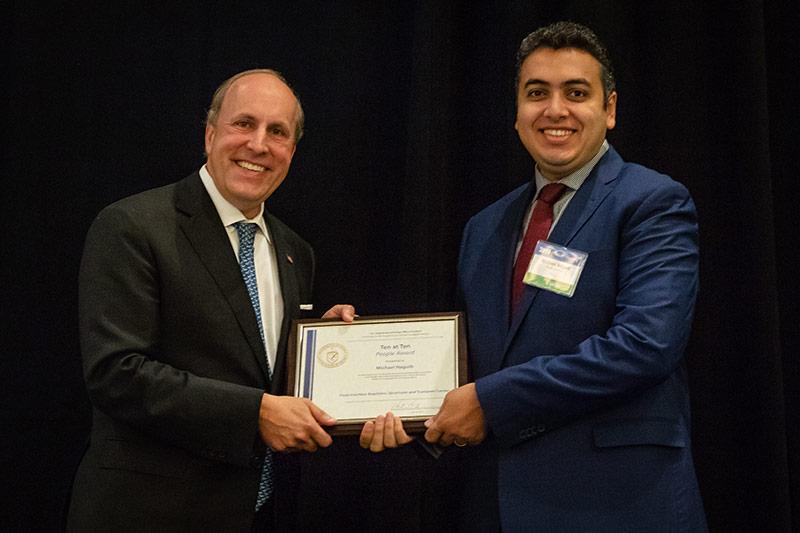Tulane researcher receives national honor for work in energy materials
A Tulane University materials physics and engineering scientist is one of only 10 scientists being honored nationally by the U.S. Department of Energy.
Michael Naguib, an assistant professor in the Tulane School of Science and Engineering, is the winner of a Ten at Ten Award from the energy department’s Energy Frontier Research Center (EFRC), a major collaborative research program established in 2009 to develop transformative energy technologies for the future.
He was cited “for developing a new family of two-dimensional materials based on transition metal carbides and nitrides that have proven to be transformative battery and supercapacitor electrode material.” The research could lead to such advancements as faster charging times for cell phones and electric car batteries.
Naguib received the award in Washington D.C. as part of a 10-year anniversary celebration of the Energy Frontier Research Center program. Nationwide, 82 centers have been supported under the program involving more than 1,600 senior investigators and more than 5,400 students at 170 institutions.
The contest was divided into three categories, and Naguib was one of three researchers to win in the People Award category.
Award winners best exemplify the extraordinary impact that the EFRCs have had on scientific ideas, technologies and tools, and people, according to the Chris Fall, director of the U.S. Department of Energy’s Office of Science. Winning projects include battery research, photovoltaics and solar energy, new materials development and the conversion of biomass to bioenergy.
Tulane is a member of the Fluid Interface Reactions, Structure and Transport (FIRST) Energy Frontier Research Center led by Oak Ridge National Laboratory, a science and technology national laboratory sponsored by the U.S. Department of Energy in Oak Ridge, Tennessee.
“I’m honored to be selected as one of the Ten at Ten awardees,” Naguib said. “It is such a great recognition for our work coming from one of the most successful collaborative research programs.”
The Ten at Ten Award is among several honors that Nagiub has received in recent years. Last year, he was listed as a Highly Cited Researcher for 2018 by Clarivate Analytics.
According to Clarivate Analytics, "Of the world population of scientists and social scientists, the Clarivate Analytics Highly Cited Researchers are one in 1,000."
Naguib also won the 2018 KROTO Award, named after the late Noble Prize laureate Sir Harold Kroto, for “outstanding achievements and contributions to the field of nanoscience and nanotechnology.”
He won the Robert L. Coble Award for Young Scholars from the American Ceramics Society, which recognizes an outstanding ceramic scientist 35 years old or younger who is conducting research in academia, industry or a government funded laboratory.

